Excerpts from "Jumping the Jahru"
By Nina Sharma Jones
That Dress
 That dress? It’s so heavy it could kill you. It will cost as much as an SUV, shouldn’t run over you like one. And in the future, no ganda bras. You need to get a wonderful one. Not better. Yes, a wonder. That’s it. Now we are getting somewhere. What a veil, it will rest heavy there but his heart, when he sees you, will come on to you. Yes, love. See, there is no need for the tension. Make sure you can walk in it. You should walk carefully. Like you are balanced on a tightrope. Make sure you cannot fall. If you should tumble, you would go right into the flame. There is no need for tension. Take a joke, just don’t tumble with one. We fought to find a place that understands our codes. Not just fire codes. We fought to find convenience and understanding in one go. Just don’t let this dress fight you.
That dress? It’s so heavy it could kill you. It will cost as much as an SUV, shouldn’t run over you like one. And in the future, no ganda bras. You need to get a wonderful one. Not better. Yes, a wonder. That’s it. Now we are getting somewhere. What a veil, it will rest heavy there but his heart, when he sees you, will come on to you. Yes, love. See, there is no need for the tension. Make sure you can walk in it. You should walk carefully. Like you are balanced on a tightrope. Make sure you cannot fall. If you should tumble, you would go right into the flame. There is no need for tension. Take a joke, just don’t tumble with one. We fought to find a place that understands our codes. Not just fire codes. We fought to find convenience and understanding in one go. Just don’t let this dress fight you.
The Ones
Sounds just like bells— kalira, their jingling the last rattle of the wedding. Even when you are all bangles, kalira long-gone from choora, they seem to remain, still dangling, like a ghost limb, if you can have a festive one. Their flinty crackle, emanating as you grab your keys, shuddering with the engines’ release, and later sandwiched in the parallel park. Tink-tink-tink until you take choora off for the job interview and place bangles, one by one, in the bucket seat, where they sluice around elegantly.
 When you pick them up, they are scrambled. You try to remember the pattern—red, red, white, red like bangle code, a tora tora, that perhaps better contains the wishes bestowed on each one of them, by every mama, the uncles you rarely see, knotted the bells, just the way they would your shoelaces, that ordinary grace present again and still there, dangling, even when you pay the meter and tink your way to newsstand, where the discounted glossies strike up strange conversation with your hands. What do you do after 40 days? the counterwoman says as you scrape out exact change. You are short a penny and ask her to break a five. Unsure, you say like an 8-ball, as she hands you back the ones.
When you pick them up, they are scrambled. You try to remember the pattern—red, red, white, red like bangle code, a tora tora, that perhaps better contains the wishes bestowed on each one of them, by every mama, the uncles you rarely see, knotted the bells, just the way they would your shoelaces, that ordinary grace present again and still there, dangling, even when you pay the meter and tink your way to newsstand, where the discounted glossies strike up strange conversation with your hands. What do you do after 40 days? the counterwoman says as you scrape out exact change. You are short a penny and ask her to break a five. Unsure, you say like an 8-ball, as she hands you back the ones.
For My Brother, My Name
This story, I tell it all the time. Time to commit it to paper I guess.
My name wasn’t supposed to be Nina. My mother wanted to name me Uma. For 8 months she carried me. I came out early, her water breaking as she lifted a sack of potatoes. I was supposed to be born on Christmas and named Uma. I want to blame it on the potatoes but don’t sacks of potatoes get enough thrown their way?
My sisters, then 10 and 8, were at dance class at the time. It must have timed out perfectly— 90 minutes of jazz hands through labor. The kids all went around the room, talking about their day or pet turtle or new shoe. “Today, my mother is going to have a baby,” my middle sister, Neeta, said, as if I was her pet turtle or new shoe, fitting me somewhere in between the two. Her name, Neeta, means wisdom. She tells me that that day all she felt was anger, towards me, for bursting through her mother’s belly like that. What kind of kid is this? She was already thinking.
Sonia, my oldest sister, would be the one to say something like that usually, not Neeta. Sonia was named after a model, not someone famous, but someone my mom noticed, incidentally, on a kitchen calendar, after the one who she didn’t get to name—he passed away that quick.
They must have gotten over me, whatever anger they had that I caused this to our mom, like sisters do. Their first sisterly act towards me. “No, you have to name her after the most beautiful woman we know,” they said to my mother. Perhaps in unison or in turns, breaking up the sentence in urgent staccato.
Nina in Spanish means baby, the enye mark on the second n, giving it a special flourish, a charming toddler wobble of a lilt. But for my sisters the marking was of a different quality.
 I imagine them watching the show, so close to the screen, the flicker casts shadows, hazy blue, on their faces. I imagine the generic pained and troubled expressions of the actors, a hand on the forehead folding like an enye mark. Why my mom let my sisters watch All My Children confounds me, as much as her letting her 8 and 10 year old daughters name her child after their favorite character, Nina Cortland.
I imagine them watching the show, so close to the screen, the flicker casts shadows, hazy blue, on their faces. I imagine the generic pained and troubled expressions of the actors, a hand on the forehead folding like an enye mark. Why my mom let my sisters watch All My Children confounds me, as much as her letting her 8 and 10 year old daughters name her child after their favorite character, Nina Cortland.
But it seems like in America something had cracked open inside all of them, even my sisters, laboring for a language to name beauty.
_____________________________________________
 NINA SHARMA JONES is a writer from Edison, New Jersey. Her work has been featured in Reverie: Midwest African American Literature, Ginosko Literary Journal, Big Apple Parent, and Riffin. She recently was awarded residency from the Vermont Studio Center. With Quincy Scott Jones, she co-created the Nor’easter Exchange: a multicultural, multi-city reading series. She is an event curator at Big Blue Marble Bookstore and is currently working on her first novel, Jumping the Jahru.
NINA SHARMA JONES is a writer from Edison, New Jersey. Her work has been featured in Reverie: Midwest African American Literature, Ginosko Literary Journal, Big Apple Parent, and Riffin. She recently was awarded residency from the Vermont Studio Center. With Quincy Scott Jones, she co-created the Nor’easter Exchange: a multicultural, multi-city reading series. She is an event curator at Big Blue Marble Bookstore and is currently working on her first novel, Jumping the Jahru.




0 comments